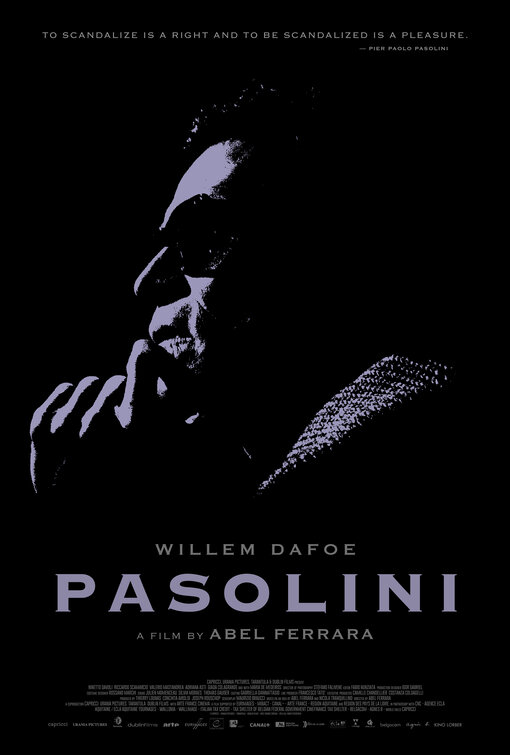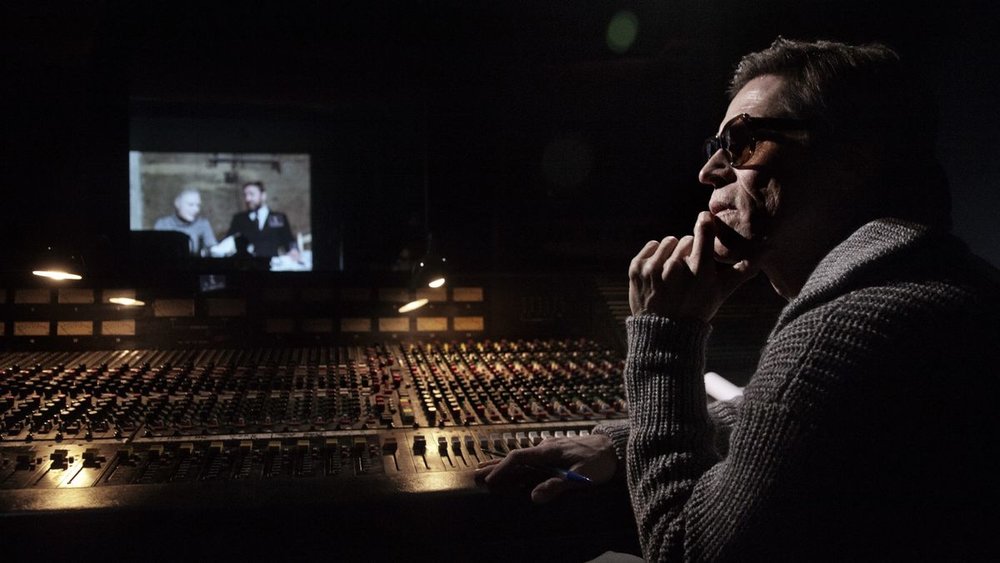Pasolini (2019)


SHOULD I SEE IT?
YES
For those who know of Pier Paolo Pasolini’s work, and those aware of the long delay in releasing this domestically, Pasolini is highly anticipated.
Willem Dafoe again reminds us just how talented and diverse an actor he truly is.
Free-wheeling, explicit, and fearless, Abel Ferrara takes a very unconventional approach in telling Pasolini’s story, mixing truth, fiction, and movie-within-a-movie segments to capture his essence.
NO
Beyond Pasolini’s and Dafoe’s staunchest defenders and fans, Pasolini is a movie that struggles to reach beyond those particular audiences.
Plays very loose with fact, and is scattershot in its narrative approach. Even some of the more patient viewers will possibly become frustrated with this whole endeavor.
While I am not sure why this has taken four-and-a-half years to land a domestic release, Pasolini lacks an urgency and energy that compels to be seen immediately.
OUR REVIEW
Whether it is the controversy typically generated by director Abel Ferrara’s filmography, or the prickly nature of its subject, Pasolini finally lands in domestic theaters some four-and-a-half years after it first premiered at the 2014 Toronto International Film Festival.
Since the film first played in front of quizzical Toronto audiences, its lead actor, Willem Dafoe, has gone on to earn two Academy Award nominations (The Florida Project, At Eternity’s Gate) and has again cemented his status as of the Hollywood’s most intriguing and compelling character actors.
Ferrara, a filmmaker with a similar enfant terrible reputation to that of his subject, benefits greatly from Dafoe looking remarkably similar to the late writer/director. Opting to have most of his film in English, though Pasolini wrote and made films in his native Italian, is a curious decision.
History informs us that the director was found dead in November 1975, on an Italian beach at the age of 53. Though many believe he was a victim of a hate crime (Pasolini was gay and the movie shows him cruising for sexual trysts), police said his murder was politically motivated and closed the case.
In the 40-plus years since his passing, Pasolini’s films have reached an almost emeritus status with fans of international cinema, cult cinema, and more provocative fare. When Ferrara’s film opens, Pasolini has wrapped production on what may be cinema’s most notorious film of all time, 1975’s brutal, gut-wrenching, widely banned, Salò, or the 120 Days of Sodom.
As he shares a meal with his mother (Adriana Asti), or reads the newspaper for example, he recognizes that word has spread of the film’s content and he already looks weary of the controversies he knows are coming. Screenwriter Maurizio Braucci scripts a film that tries to take us into the writer/director’s head-space and creative process. Over the course of what feels like a more-than-adequate 84 minutes, Dafoe captivates every moment on screen.

In an irresistible example of stunt casting, Ferrara brings Pasolini’s former lover and star of many of his films, Ninetto Davoli, into the mix. Here, he portrays a character named Epifiano, who exists in something of a movie-within-a-movie. Epifiano sets out to find the Feast of Fertility, a ceremonial orgy where gays and lesbians procreate with each other to populate the human race on just one night a year. Ferrara cannot resist in going full meta with these scenes, as Davoli stars alongside a younger iteration of himself (Riccardo Scamarcio).
While those scenes simply do not work well in the larger context of Pasolini, they certainly resemble some of the off-kilter, innovative, and scattershot approach Pasolini would take to creating his films. Unfortunately, Ferrara struggles to find a linear voice through the non-linear and fragmented storytelling approach he has adopted when sharing elements of Pasolini’s unpublished work.
One scene steals the show: Pasolini is interviewed by an Italian journalist, largely transcribed from an actual interview the director gave in the days prior to his death. In these moments, the movie slows down and narrows its focus, with Dafoe stunning.
All at once compliant, but increasingly aggravated by the entire endeavor, he pivots from a good interview subject to an agitated one. The journalist asks good questions, but when Pasolini stammers for a moment and feels vulnerability, he ends the interview, claiming his answers were not good enough and he would like to take a crack at them again in writing.
We get a glimpse of the man and his process, and momentarily feel a connection. He looks both brave and vulnerable all at once. And for a complicated man, who seldom made it easy to gain understanding as to why he created such stark, unrelenting, visceral cinema that shocked audiences again and again, Dafoe seemingly captures his spirit right before our very eyes.
CAST & CREW
Starring: Willem Dafoe, Ninetto Davoli, Riccardo Scamarcio, Valerio Mastandrea, Roberto Zibetti, Damiano Tamilia, Adriana Asti, Maria de Medeiros, Lucien Rumiel.
Director: Abel Ferrara
Written by: Maurizio Braucci
Based on an idea by Abel Ferrara, Nicola Tranquillino
Release Date: May 10, 2019
Kino Lorber
